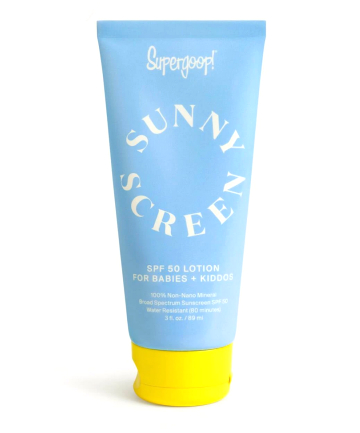If there's just one skin care product you apply every single day, it ought to be sunscreen. The lotion-y stuff — recommended by every single dermatologist you'll ever meet — protects your delicate skin from the sun's powerful UVA and UVB rays. That translates into fewer painful sunburns and slows down the aging clock... but more importantly it protects you from developing skin cancer, which currently affects one in every five Americans. With expert insight, we're breaking down the sunscreen basics, so you can shield yourself!
Image via Imaxtree
Image via Imaxtree
Anyone over the age of six months should apply sunscreen. This includes people of fair and dark complexions (yes, even those lucky people who swear they "never burn"). Everyone is susceptible to UV damage — no exceptions!
The only caveat is that babies younger than six months should wait to wear sunscreen until they hit that half-year mark. This is because their skin is so delicate, and they may experience adverse reactions to the ingredients found in traditional sunscreens. Babies under six months should be concealed from the sun as much as possible with clothing, hats, and covers. At around six months they can begin wearing physical/mineral-based sunscreens. For babies over six months (and you, of course!), try Supergoop Sunnyscreen 100% Mineral Lotion, $26.
Buy now
The only caveat is that babies younger than six months should wait to wear sunscreen until they hit that half-year mark. This is because their skin is so delicate, and they may experience adverse reactions to the ingredients found in traditional sunscreens. Babies under six months should be concealed from the sun as much as possible with clothing, hats, and covers. At around six months they can begin wearing physical/mineral-based sunscreens. For babies over six months (and you, of course!), try Supergoop Sunnyscreen 100% Mineral Lotion, $26.
Buy now
The rule of thumb is to wear a broad-spectrum SPF of at least 30 every single day. A raspberry-sized amount should be applied to your face and a shot-glass amount to the rest of your body. Reapplication should occur every two hours when outside, and every four hours when inside, as well as anytime you get out of the pool/water or have been sweating.
Reapplication — especially over makeup — might seem an annoying task. There are a handful of products that'll make your life easier, though. For example, Acwell's UV Cut SPF 50+PA++++ Natural Sun Cushion, $35, comes in a handy compact and goes on invisible over your makeup.
Buy now
Reapplication — especially over makeup — might seem an annoying task. There are a handful of products that'll make your life easier, though. For example, Acwell's UV Cut SPF 50+PA++++ Natural Sun Cushion, $35, comes in a handy compact and goes on invisible over your makeup.
Buy now
SPF is necessary whenever you're exposed to the sun. What you may not realize, however, is that you're exposed almost constantly.
"This includes walking to work, being inside your car, [or sitting in a room with a window]. UV-A rays, which cause both skin cancer and premature aging, can pass through glass windows," says Dr. Brian Ginsberg, a board-certified dermatologist and assistant professor at Mount Sinai Hospital. "Also, don't be fooled by a cloudy or snowy day. Clouds can let through up to 80 percent of the UV light, and snow reflects it, which actually increases your need for protection."
SPF should be applied anywhere that's exposed, including your face, chest, hands, ears, tops of your feet, and even your scalp. Sun Bum's Scalp & Hair Mist SPF 30, $14.99, has you covered — literally — on that last one!
Buy now
"This includes walking to work, being inside your car, [or sitting in a room with a window]. UV-A rays, which cause both skin cancer and premature aging, can pass through glass windows," says Dr. Brian Ginsberg, a board-certified dermatologist and assistant professor at Mount Sinai Hospital. "Also, don't be fooled by a cloudy or snowy day. Clouds can let through up to 80 percent of the UV light, and snow reflects it, which actually increases your need for protection."
SPF should be applied anywhere that's exposed, including your face, chest, hands, ears, tops of your feet, and even your scalp. Sun Bum's Scalp & Hair Mist SPF 30, $14.99, has you covered — literally — on that last one!
Buy now
Speaking of scalp sunscreen... there are many different SPF formulations available ranging from oils to creams to serums to powders. They all fall into two primary categories though: mineral/physical and chemical. Let's talk about the former.
The former utilizes ingredients such as zinc oxide and titanium dioxide which essentially reflect the sun's rays. For example, Versed's new Guards Up Daily Mineral Sunscreen Broad Spectrum SPF 35, $21.99, utilizes non-nano zinc oxide to protect skin. It's also formulated with pollution fighting moringa seed extract and sea fennel to help block blue light damage.
Buy now
The former utilizes ingredients such as zinc oxide and titanium dioxide which essentially reflect the sun's rays. For example, Versed's new Guards Up Daily Mineral Sunscreen Broad Spectrum SPF 35, $21.99, utilizes non-nano zinc oxide to protect skin. It's also formulated with pollution fighting moringa seed extract and sea fennel to help block blue light damage.
Buy now









